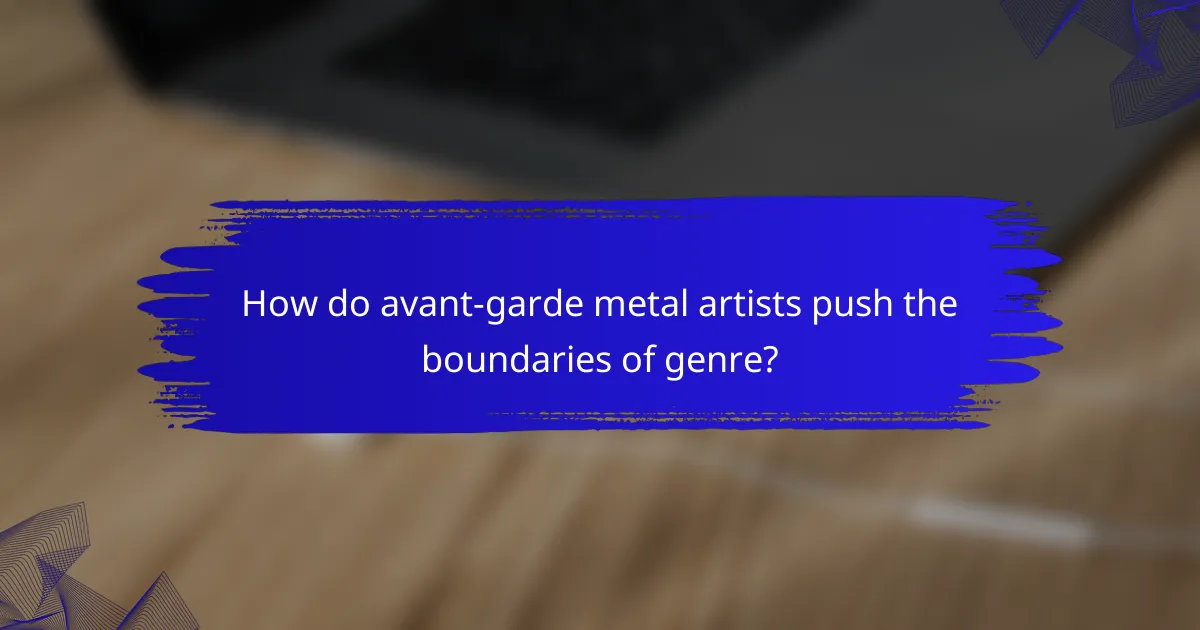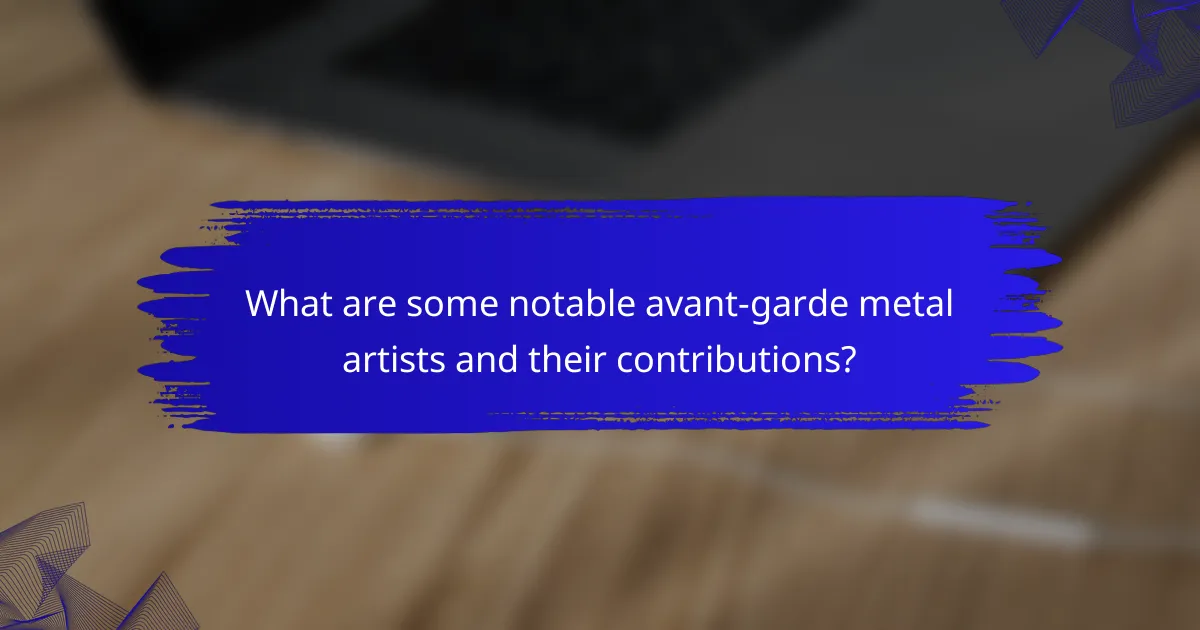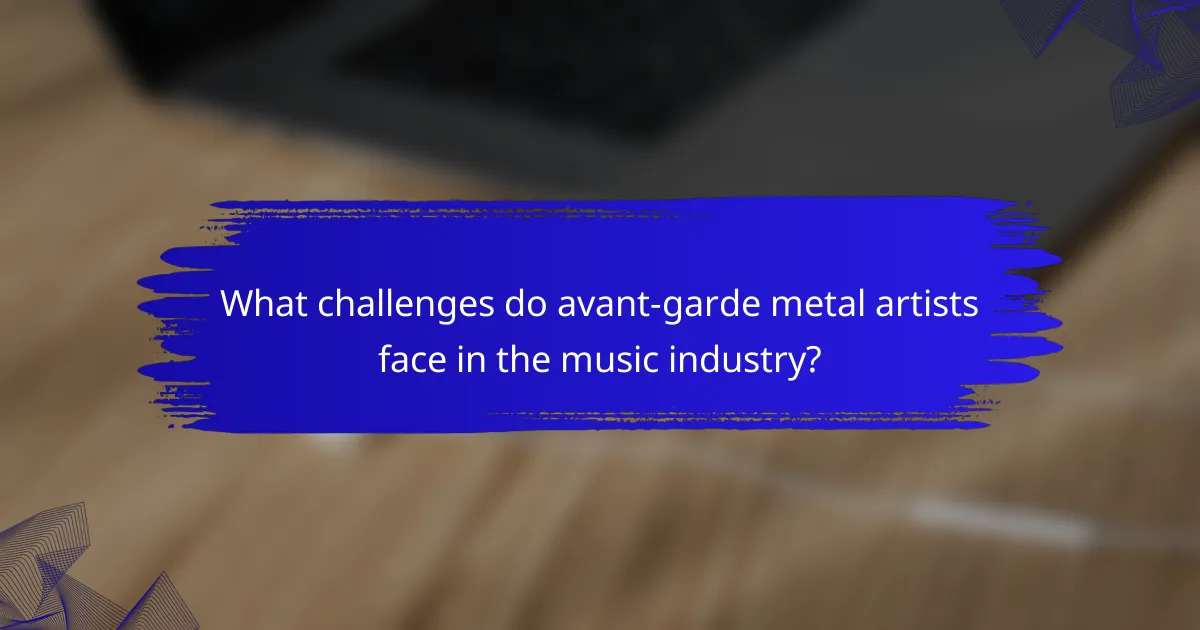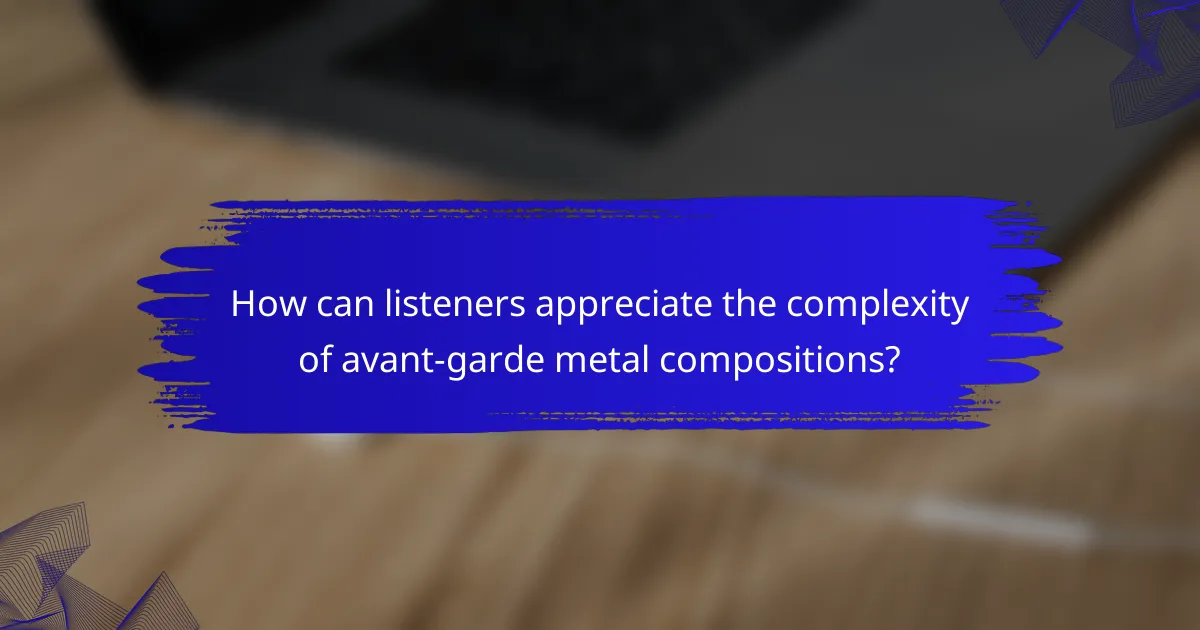Avant-garde metal innovations push musical boundaries through experimental techniques and genre-blending. This article explores unique elements like polyrhythmic structures and unconventional instrumentation. It highlights notable artists such as Meshuggah and Opeth, who redefine metal norms. Additionally, it discusses the challenges these artists face in gaining mainstream acceptance and how listeners can appreciate their complex compositions.

What are the defining characteristics of avant-garde metal innovations?
Avant-garde metal innovations are characterized by their experimental approaches, genre-blending, and unconventional structures. These attributes allow artists to push musical boundaries and explore new sonic landscapes. Unique elements include the incorporation of diverse influences like jazz, classical, and electronic music, resulting in complex compositions. Rarely, some artists utilize unconventional instruments or techniques, further distinguishing their sound. This genre’s defining traits foster creativity and challenge traditional metal norms.
How do experimental techniques influence sound design in avant-garde metal?
Experimental techniques significantly shape sound design in avant-garde metal by pushing sonic boundaries. Artists utilize unconventional instruments, extended techniques, and digital manipulation to create unique textures and atmospheres. These innovations often lead to the incorporation of non-traditional rhythms and structures, resulting in a distinct listening experience. Additionally, the blending of genres and influences enhances the genre’s complexity and depth.
Which thematic concepts are prevalent in avant-garde metal lyrics?
Avant-garde metal lyrics often explore themes of existentialism, surrealism, and societal critique. These concepts manifest through abstract imagery and unconventional narratives. Artists frequently challenge traditional song structures, incorporating philosophical and psychological elements. This experimentation reflects a unique attribute of the genre, distinguishing it from mainstream metal. Additionally, rare themes such as mythology and science fiction appear, further enhancing the depth of lyrical content.

How do avant-garde metal artists push the boundaries of genre?
Avant-garde metal artists redefine genre boundaries through innovative techniques and unconventional elements. They incorporate diverse influences, blending genres like jazz, classical, and electronic music. Unique vocal styles, complex time signatures, and experimental instrumentation challenge traditional metal norms. Artists like Meshuggah and Opeth exemplify this approach, pushing the limits of rhythm and melody. Their willingness to explore abstract concepts and unconventional song structures sets them apart, creating a distinctive sound that continually evolves.
Which instruments and technologies are commonly used by experimental artists?
Experimental artists commonly use a variety of instruments and technologies, including synthesizers, samplers, and unconventional acoustic instruments. They often incorporate digital audio workstations (DAWs) for composition and production. Unique attributes include the use of live coding and generative software to create real-time music. Rarely, some artists utilize interactive installations that blend visual art with sound, enhancing audience engagement.
What role does improvisation play in avant-garde metal performances?
Improvisation is crucial in avant-garde metal performances as it enhances creativity and spontaneity. Artists often blend genres and techniques, creating a unique soundscape. This unpredictability allows musicians to explore new musical ideas, reflecting the genre’s experimental nature. Improvisation often leads to rare live moments that cannot be replicated, making each performance distinct.

What are some notable avant-garde metal artists and their contributions?
Notable avant-garde metal artists include Meshuggah, Opeth, and Arcturus, each contributing unique innovations. Meshuggah is known for polyrhythmic structures and complex time signatures, pushing the boundaries of rhythm in metal. Opeth blends progressive rock with death metal, creating atmospheric soundscapes and intricate compositions. Arcturus is recognized for their avant-garde approach, incorporating elements of classical music and electronic sounds, establishing a distinct identity within the genre. Other influential artists like Fantômas and The Ocean have also explored unconventional structures and themes, further enriching avant-garde metal’s landscape.
Which artists are recognized for their innovative approaches in the genre?
Artists recognized for innovative approaches in avant-garde metal include Meshuggah, Opeth, and Sleep. These bands push boundaries through complex structures, blending genres, and unique soundscapes.
Meshuggah is known for their polyrhythmic techniques and mathematical compositions, creating a distinct sound that influences many. Opeth combines progressive rock elements with death metal, offering a diverse musical experience. Sleep revitalizes stoner metal with heavy riffs and immersive atmospheres, showcasing innovation in their genre.
These artists exemplify the unique attributes of avant-garde metal, challenging traditional norms and expanding the genre’s creative possibilities.
How do regional influences shape the work of avant-garde metal musicians?
Regional influences significantly shape avant-garde metal musicians by infusing their work with unique cultural elements and local sounds. These musicians often draw inspiration from their surroundings, integrating traditional music styles and themes reflective of their heritage. For instance, Scandinavian bands may incorporate folk melodies, while Japanese artists might blend traditional instruments with modern metal.
The experimentation with diverse musical scales and rhythms allows for innovative compositions that challenge conventional metal norms. This cultural fusion results in distinctive soundscapes, pushing the boundaries of the genre. Additionally, regional themes often address local social issues, adding depth and context to their music.
As a result, avant-garde metal becomes a rich tapestry of influences, showcasing the artists’ identities and experiences. This dynamic interplay between regional culture and musical innovation is a hallmark of the avant-garde metal movement.

What challenges do avant-garde metal artists face in the music industry?
Avant-garde metal artists face significant challenges in the music industry, including limited mainstream acceptance and financial instability. Their experimental nature often alienates traditional metal audiences, making it difficult to gain traction. Additionally, securing funding for innovative projects can be a struggle due to niche appeal. The complexity of their music can lead to challenges in live performance settings, where audience engagement is crucial. Furthermore, navigating distribution channels that favor more conventional genres can hinder their visibility.
How does audience reception differ across various cultural contexts?
Audience reception of avant-garde metal varies significantly across cultural contexts due to differing musical tastes, societal values, and historical influences. In Western cultures, experimental artists often receive acclaim for innovation and complexity. Conversely, in some Eastern cultures, traditional music may dominate, leading to a more cautious reception of avant-garde elements. Additionally, niche audiences in various regions may embrace avant-garde metal for its boundary-pushing nature, while mainstream listeners might find it challenging. Understanding these dynamics is crucial for artists aiming to connect with diverse audiences.
What are the common misconceptions about avant-garde metal?
Common misconceptions about avant-garde metal include the belief that it lacks structure, is inaccessible, or is merely experimental noise. In reality, avant-garde metal often incorporates complex compositions, innovative techniques, and diverse influences. Many artists blend genres, creating rich soundscapes that challenge traditional metal norms. This genre thrives on creativity and artistic expression, making it more than just an experimental phase.

How can listeners appreciate the complexity of avant-garde metal compositions?
Listeners can appreciate avant-garde metal compositions by engaging with their intricate structures and innovative techniques. This genre often incorporates unconventional time signatures, polyrhythms, and diverse instrumentation, creating a complex soundscape. Artists like Meshuggah and Opeth exemplify these traits, blending heavy riffs with melodic elements. The use of dissonance and experimental soundscapes challenges traditional musical norms, inviting deeper listening experiences. Exploring the lyrical themes, which often delve into philosophical and abstract concepts, further enhances appreciation for the genre’s depth and creativity.
What are effective strategies for engaging with avant-garde metal music?
To engage effectively with avant-garde metal music, immerse yourself in its diverse soundscapes and unconventional structures. Explore the experimental techniques used by artists to break traditional boundaries. Attend live performances to experience the genre’s dynamic energy. Collaborate with fellow enthusiasts to share insights and interpretations. Analyze lyrics and themes for deeper understanding. Engage in online communities to discuss innovations and emerging artists.
Which resources can enhance understanding of avant-garde metal concepts?
Exploring avant-garde metal can be enhanced through various resources. Key sources include specialized music journals, online forums, documentary films, and artist interviews.
1. Specialized music journals provide in-depth analyses of avant-garde metal trends and artists.
2. Online forums facilitate discussions and insights from fans and musicians alike.
3. Documentary films showcase the evolution and innovation within the genre.
4. Artist interviews reveal personal perspectives on creativity and experimentation.
These resources collectively deepen understanding of avant-garde metal concepts and its unique attributes.
What best practices should aspiring avant-garde metal artists consider?
Aspiring avant-garde metal artists should focus on innovation, authenticity, and collaboration. Embrace unconventional sounds and structures to define your unique style. Experiment with diverse genres, instruments, and lyrical themes to expand your creative palette. Networking with other artists can lead to valuable collaborations and exposure. Regularly engage with your audience through social media to build a dedicated fan base. Finally, invest time in honing your technical skills, as proficiency can enhance your experimental approach.